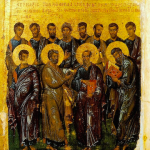I have been very busy with classes this week, so I have not followed the flap about Planned Parenthood, abortion and Vox Nova closely. However, I have been reading a bit about it and I wanted to offer some of my own thoughts. If these have already appeared in other posts and comm boxes, well, I guess this will just show that great minds think alike! 🙂
I have never been a fan of Planned Parenthood, but I have been equally disturbed by the tenor of the campaign against it in some pro-life circles. I am not denying the great evil they do as one of the largest abortion providers in the U.S., but they are not wholly evil. In charity, I believe that many, if not most of the people who work there believe that they are doing the right thing, and in the midst of the evil they do, they also do some small good: counseling, social work, some reproductive health and pre-natal care. These goods do not offset or cancel the evil they do, but they provide context, and suggest that they are not the personification of pure evil.
This leads me to consider the counselors caught on tape. It is worth remembering that any recording is not reality: it is an image or representation of reality, and not the totality of what happened. This is not to suggest deliberate or malicious editing: this is the very nature of any representation of reality: it is inherently incomplete. So we have no way to know what happened before or after. (In the most recent incident, Planned Parenthood announced that after the conversation, they notified the authorities.)
Here I want to probe at the actual response of the counselor, which seemed tolerant, if not accepting of child prostitution. One explanation is an institutional culture which urges counselors to be non-judgmental, so as to not scare off clients. The idea being that first you build trust by providing needed services, and then on the basis of this trust discuss the larger issues. One reason I thought of this is that this very discussion came up at a recent meeting of my Franciscan fraternity. We give a monthly tithe, and one of the recipients is the local Birthright. A member raised the concern that Birthright did not do any moral counseling to these (mostly unwed) pregnant women on the immoral nature of their activities. Another member, who was a volunteer counselor, made exactly the argument made above: the women are scared and in need, and it is better to tend to their needs without judging them, in order to build up a relationship. (A real fear is that a judgmental response will drive them away and lead to their getting abortions.)
But does this response by the counselor at Planned Parenthood mean that the organization or the counselor support child prostitution? I think a fair answer would be no. I am reasonably sure that if asked, in the abstract, the clinic director and the staff of one of these Planned Parenthood clinics would respond with horror to the suggestion that they support child prostitution. So how does it come about that in at least one case, they did? It was not policy, except indirectly, in the sense of directing counselors to be non-judgmental in their dealings with clients.
I suggest that it was, rather, a mindset, an internal culture that shaped their responses so that in effect, they were supporting the intolerable. Just as they have convinced themselves, for the best of reasons, that providing abortions is the right thing to do, they have expanded upon the notions of privacy, individual liberty and choice to the point that they can, in practice, accept (perhaps with some internal qualms) things they would in the abstract condemn. Again, in most cases, I think these qualms would get the better of the counselors, and they would report matters to the authorities. In some cases, they do not, and the people involved cooperate with (or turn a blind eye to) prostitution and abuse of minors.
This does not excuse their actions, but it provides context, and as any confessor knows, sin cannot be understood, and repentance cannot be brought about, without understanding context. And again, it shows that we are dealing with human beings, and not evil automata.
I am sure that I am going to be accused of defending or excusing the inexcusable, which brings me to the title of this post. It seems to me that we have to apply the same ethical analysis to ourselves and the pro-life movement. Periodically, there are violent attacks on abortion providers and abortion clinics: bombings, shootings, a few cold-blooded murders. The pro-life movement is quick to distance itself from these acts. And, indeed, in the abstract, the vast majority of the members of the movement are horrified by these acts of violence. And certainly, there is no over-arching policy calling for abortionists to be hunted down and killed. But if we listen to ourselves, the ways in which we demonize abortion providers, the ways in which we paint them as pure evil, then we have to acknowledge that we are creating an internal culture which lets some people cross the line, either to harassment (and posting names and pictures on websites can be nothing but) or to violence.
In think that in both cases—the abortion counselor who turns a blind eye to child prostitution, and those who act with violence against abortion counselors—we need to apply the same moral analysis. I am not excusing or condoning either action. But both must be put into their moral context, and if need be, we need to accept some of the responsibility for creating that context, just as we demand that Planned Parenthood, as an organization, accept responsibility for what individual counselors do.












